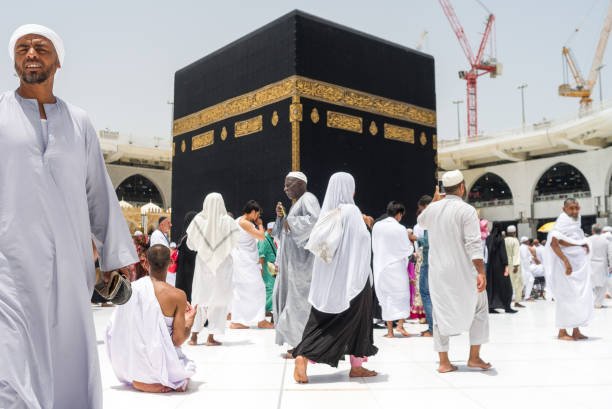
Aya Yesentayeva
Luxury Hotelier | Travel Enthusiast
While most major religious sites worldwide welcome visitors of all faiths, Mecca stands as a unique exception, but can non muslims enter mecca?
This holy city, receiving over 2 million pilgrims annually during Hajj alone, maintains a strict policy that has been in place for over a millennium: non-Muslims are forbidden from entering its boundaries.
This distinctive restriction, rooted in Islamic scripture and reinforced by Saudi Arabian law, transforms Mecca into more than just a city—it becomes a sacred space exclusively preserved for Muslim worship.
The policy, far from being merely traditional, reflects deep theological significance and practical considerations that have shaped the city’s character for generations.
Historical and Religious Reasons
Islamic Scriptures
The prohibition of non-Muslims entering Mecca stems from a divine commandment in the Quran, specifically Surah Al-Tawbah, verse 28.
This verse explicitly states that polytheists are considered spiritually impure and should not approach al-Masjid al-Haram (the Sacred Mosque).
This divine decree forms the cornerstone of the restriction, emphasising that Mecca’s sanctity must be preserved as a place of pure Islamic worship.

Prophetic Declarations
Prophet Muhammad established clear boundaries regarding access to the holy cities. He specifically restricted non-Muslims from entering Madinah, setting a precedent that would later be applied more broadly.
This religious directive was formally codified in 1081 AD, partly in response to security concerns during the Crusades. Today, these prophetic guidelines continue to shape Saudi law, which strictly enforces the ban on non-Muslim visitors to Mecca.
The restriction ensures the city maintains its primary purpose as a centre for Islamic worship rather than becoming a tourist destination.
Significance of Mecca and Medina
Paramount Importance in Islam
Mecca holds the distinction of being Islam’s holiest city, marked by its profound connection to Prophet Muhammad’s birth and the presence of the sacred Kaaba. At the heart of Mecca stands the Ḥaram Mosque, housing the ancient granite cube covered by the kiswa.
This structure serves as the qiblah – the direction all Muslims face during their daily prayers. A prayer performed in Mecca is believed to carry 100,000 times more spiritual reward than prayers offered elsewhere.
Spiritual and Cultural Legacy
Medina, the second holiest city, derives its significance from being Prophet Muhammad’s burial place and the site of his governance.
The city’s jewel, Masjid an-Nabawi (Prophet’s Mosque), contains Muhammad’s tomb and represents a crucial pilgrimage destination. Both cities form the cornerstone of Islamic worship through the Hajj pilgrimage, one of Islam’s five pillars.
This mandatory journey brings millions of Muslims to these sacred sites annually, reinforcing their role as spiritual centres where Islamic civilization and practices have flourished for centuries.
Legal and Regulatory Framework
Saudi Arabian Law
Saudi Arabia strictly prohibits non-Muslims from entering Mecca and enforces significant restrictions in Medina.
The government has established comprehensive legal frameworks that make it illegal for non-Muslims to enter these holy cities. Violations of these restrictions can result in severe penalties, including deportation and potential criminal charges. Additionally, the public practice of any religion other than Islam is prohibited throughout the kingdom.
Visa Restrictions
Entry to Mecca requires specific religious visas – either Hajj or Umrah visas – which are exclusively issued to Muslim travellers.
The application process involves thorough verification of religious identity, often requiring applicants to provide certificates from recognised Islamic institutions.
Multiple checkpoints around Mecca enforce these regulations through various methods, including examining visitors’ documentation, dress, and behaviour.
In Medina, while restrictions are slightly less stringent, non-Muslims are still barred from entering key areas, particularly Nabawi Square, which houses the sacred Al-Masjid Al-Nabawi. These measures effectively maintain the sanctity of these holy sites while ensuring compliance with both religious mandates and national security protocols.
Enforcement and Checkpoints
Passport Checks
The Saudi government implements rigorous verification methods at entry points to ensure only Muslims enter Mecca. Officials carefully examine passports and travel documents at arrival registration counters.
For Muslim converts, authorities may request a shahada certificate or ask them to recite the shahada on the spot. Religious status is often indicated directly on passports from Arab countries, while visitors from Western nations must obtain Muslim certificates from recognised mosques.
Road Checkpoints
Multiple checkpoints strategically placed around Mecca’s borders act as the first line of defence against unauthorised entry.
Officials conduct random vehicle inspections and verify individuals’ Muslim status through various means, including checking Islamic attire and testing knowledge of Islamic rituals and Arabic greetings. Guards assess visitors’ names, behaviour, and overall appearance to confirm their religious identity.
The checkpoint system effectively maintains the city’s sanctity while ensuring strict compliance with religious and legal requirements. Those attempting to circumvent these measures face serious consequences, including immediate deportation, imprisonment, and potential criminal charges.
Consequences for Non-Compliance
Legal Repercussions
Non-Muslims who attempt to enter Mecca face severe legal consequences under Saudi Arabian law. The penalties include immediate deportation from the country and substantial fines.
In more serious cases, particularly those involving deliberate deception of authorities, offenders may face imprisonment. This was demonstrated in recent incidents, such as when an Israeli journalist illegally entered the holy city, resulting in criminal charges against both him and his driver.
The Saudi government maintains a zero-tolerance policy towards violations, implementing these punishments to preserve the sanctity of the holy sites.
Anyone caught attempting to circumvent the entry restrictions faces swift action from Saudi authorities, with consequences potentially extending beyond immediate penalties to affect future travel possibilities to Saudi Arabia.
These strict measures reflect the deep religious significance of Mecca and the importance placed on maintaining its sacred status. The enforcement of these regulations ensures that the city remains a dedicated space for Islamic worship, free from tourism or non-religious visits.
Cultural Sensitivities and Respect
Respect for Islamic Customs
Understanding and respecting Islamic customs is crucial in Saudi Arabia, where Islamic law governs all aspects of daily life. Visitors must adhere to strict religious protocols, including observing prayer times and fasting during Ramadan.
The country’s conservative interpretation of Islam requires careful attention to cultural sensitivities, particularly around holy sites and during religious observances.
Dress Code and Behavior
Modest dress is mandatory for all visitors approaching Mecca’s vicinity, even at checkpoints.
Women must wear loose-fitting clothes covering their entire body except for hands and face, while men should wear long trousers and shirts that cover their shoulders. Public behavior must align with Islamic principles, including:
- Using the right hand for eating and passing items
- Avoiding public displays of affection
- Refraining from loud or disruptive behavior
- Respecting prayer times and religious practices
Even Muslims visiting the holy sites must demonstrate proper reverence through their conduct and appearance. Photography restrictions apply in certain areas, and visitors should always seek permission before taking pictures of local people or religious buildings.
Exceptions and Other Guidelines
Access to Other Mosques
Outside of Mecca and the central area of Medina’s Prophet’s Mosque, non-Muslims can visit many other mosques throughout Saudi Arabia with certain limitations. Visitors must obtain permission from mosque authorities and observe strict protocols.
Most mosques allow non-Muslims to view their architectural beauty from designated areas, though entry into prayer halls remains restricted. Some historical mosques offer guided tours during non-prayer times, providing valuable insights into Islamic culture and architecture.
Special Cases
Those who convert to Islam gain immediate access to Mecca and Medina upon receiving their official conversion certificates from recognised Islamic centres.
New converts must present documentation proving their Muslim status at checkpoints, including a formal shahada certificate. Security measures remain stringent even for converts, requiring thorough verification of religious authenticity.
These restrictions serve multiple purposes beyond religious significance. They help maintain security, prevent potential cultural conflicts, and preserve the sacred atmosphere of these holy sites.
The Saudi government’s careful balance between religious preservation and security considerations ensures these holy cities remain protected while still allowing meaningful access to those who embrace Islam.
Safety and Security Concerns
Security considerations play a vital role in maintaining the ban on non-Muslims entering Mecca.
Historical incidents have demonstrated the importance of these restrictions, particularly the 1979 Grand Mosque siege, which resulted in significant loss of life and highlighted potential vulnerabilities. This event led to enhanced security measures throughout the holy city.
The Saudi authorities maintain strict control through sophisticated surveillance systems and trained personnel to prevent unauthorized entry. These measures help protect the millions of Muslim pilgrims who visit annually for Hajj and Umrah rituals.
The presence of non-Muslims could potentially disrupt these sacred ceremonies, as they may be unfamiliar with the complex religious protocols and movements required during worship.
Additionally, the ban helps prevent potential espionage or activities that could compromise the security of pilgrims.
This concern stems from historical attempts to infiltrate the holy sites, including a notable incident in 2002 when an American journalist entered Mecca illegally, causing widespread concern about security breaches.
These experiences have reinforced the necessity of maintaining strict access controls to preserve both the sanctity and safety of Islam’s holiest site.
Tourism and Alternative Destinations
Saudi Arabia offers numerous captivating destinations for non-Muslim visitors seeking cultural experiences. Riyadh, the capital city, presents a vibrant mix of modern attractions, including Boulevard World theme park, thrilling desert adventures like dune bashing, and hot air balloon experiences.
Jeddah stands out as particularly welcoming for solo and female travellers, featuring the iconic King Fahad’s Fountain and world-class diving opportunities in the Red Sea.
The city’s numerous mosques, including the King Fahad Mosque, are open to non-Muslim visitors.
The ancient city of Al Ula captivates with its historical significance and natural wonders, while the Red Sea region offers exceptional water sports and desert biking adventures.
For nature enthusiasts, Asir National Park showcases diverse landscapes and cultural heritage sites.
More recent developments include the opening of Medina to non-Muslim tourists, though with specific restrictions.
While the Prophet’s Mosque remains off-limits, visitors can explore attractions like Quba Mosque and the Historic Oasis Farm. Alternative beach destinations like Half Moon Bay, Farasan Island, and Umluj provide serene coastal experiences with stunning sunsets and pristine waters.
Preserving Sacred Heritage
The prohibition of non-Muslims entering Mecca represents a unique intersection of religious doctrine, legal framework, and cultural preservation. While this restriction might seem unusual in our increasingly interconnected world, it serves to maintain the profound spiritual significance of Islam’s holiest site.
For those seeking to understand Islamic culture, Saudi Arabia offers numerous alternative destinations that welcome visitors of all faiths. These locations provide valuable insights into Islamic heritage while respecting the sacred nature of Mecca and its special role in Muslim worship.
Learn more about the Kingdom of Saudi Arabia with us at SaudiTravelandleisure.com

